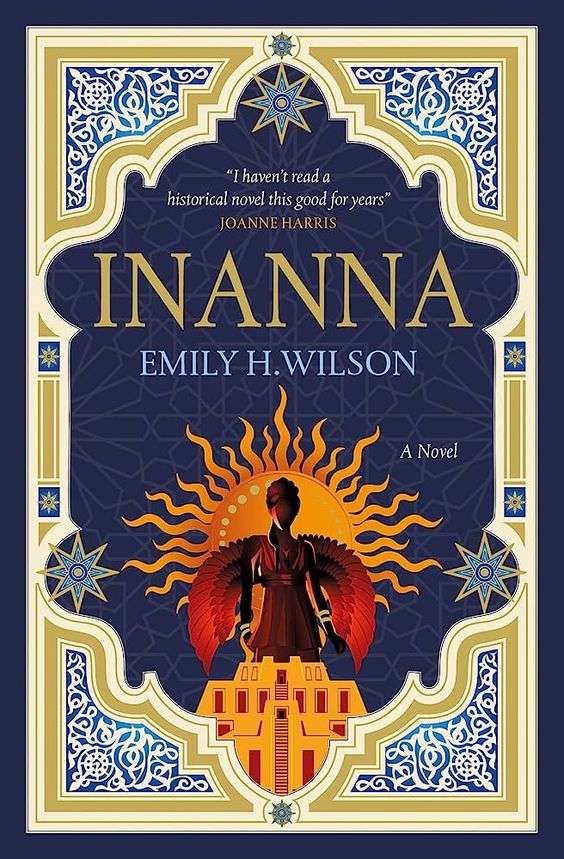We’ve implemented some new protocols around sending us messages via this website. Please email website “at” britishfantasysociety “dot” org for any issues.

For all things fantasy, horror, and speculative fiction
-
Announcement:

Inanna
Inanna by Emily H. Wilson from @TitanBooks #BookReview #Fantasy #Mythology
Inanna by Emily H. Wilson
Titan Books, pb, £8.79
Reviewed by Rym Kechacha

Inanna is the thirteenth Anunnaki, the first goddess born to the immortals in a long time and given the somewhat surprising remit of love and war. Gilgamesh – yes, that Gilgamesh – is the mortal son of two Anunnaki gods, a skilled warrior who is constantly, loveably, bouncing from one scrape to another. Ninshubar is a warrior cast out of her far-away tribe to arrive in Sumer as a slave. This novel, the first in a trilogy, is composed of three first-person narratives as these characters love, fight and go to war.
Although I am not at all familiar with the stories about Gilgamesh, it’s surprising how much you can pick up subconsciously when a story lurks in the culture, quietly dripping into other stories and influencing them in ways you don’t quite understand and can’t quite trace. I have always found there is an imprinting effect with myth retellings that often means the first time you hear or read a tale, that becomes the version you think of as ‘correct’. It’s a reaction that I’ve managed to let go of as I’ve got older, and now I’m able to immerse myself in the richness of other interpretations and become interested in the differences, which tell us as much about the myth as the similarities. I wasn’t in that situation reading this novel, so my enjoyment of the story was, in some ways, more naive and sweeter for it.
The author, Emily H. Wilson, explains that she spliced together events from the Epic of Gilgamesh and two myths about Inanna: her descent into the underworld and her marriage to fellow Annunnaki immortal Dumuzi. These stories have survived because they were inscribed on clay tablets, and when they were dug up, along with other evidence of modern civilisation’s origins, they revealed details of some of the oldest known stories.
The novel is confidently and accessibly written, and the immense amount of research is worn very lightly throughout the story. I did find Inanna’s lack of knowledge and curiosity about her circumstances and the world around her frustrating at times, but there’s a lot of mystery here to keep you intrigued. The dialogue is witty and sharp, and there is a modern feeling to the way the characters interact, which I know some readers find jarring and anachronistic in historical fantasy, but I always enjoy because it brings a humanity to the writing and – perhaps paradoxically – a timelessness to the characters and the ways they move around the world. This goes back to the core of why we tell and retell these stories over and over again; there’s a comfort in moving from archetype to personality and back again as we navigate the ways the tales echo in our modern world.
But perhaps the biggest reason to retell these myths is that they are immensely enjoyable. Inanna is an epic fantasy, with wars and high-born people competing for high stakes with incredible skills, but set in a world recognisably ours, a world you could imagine yourself living in if you squint a little. It will appeal to fans of any retelling, especially those who have feasted on the recent glut of retellings from Ancient Greek mythology and can’t get enough of gods behaving badly and what that tells us about ourselves.
Explore the blog:
Blog categories:
Latest Posts:
Tags:
#featured (56) #science fiction (25) Book Review (264) events (44) Fantasy (231) Graphic Novel (13) horror (136) Members (62) Orbit Books (48) profile (43) Romance (17) Science Fiction (50) short stories (28) Titan Books (52) TV Review (15)
All reviews
Latest Reviews:
- THE HOUSE ON THE BORDERLAND by William Hope Hodgson
- Monstrum by Lottie Mills
- Mood Swings by Dave Jeffery
- Yoke of Stars by R.B. Lemberg
- Hera by Jennifer Saint
- The Black Bird Oracle by Deborah Harkness
- RETURN OF THE DWARVES By Markus Heitz
- Delicious in Dungeon
- Toxxic by Jane Hennigan
- THIS ISLAND EARTH: 8 FEATURES FROM THE DRIVE-IN By Dale Bailey
Review tags:
#featured (2) Action (4) Adventure (4) Book Review (28) Fantasy (18) Featured (2) Feminist (2) Gothic Horror (3) Horror (14) Magic (3) Orbit Books (3) Romance (6) Science Fiction (5) Swords and Sorcery (2) Titan Books (7)